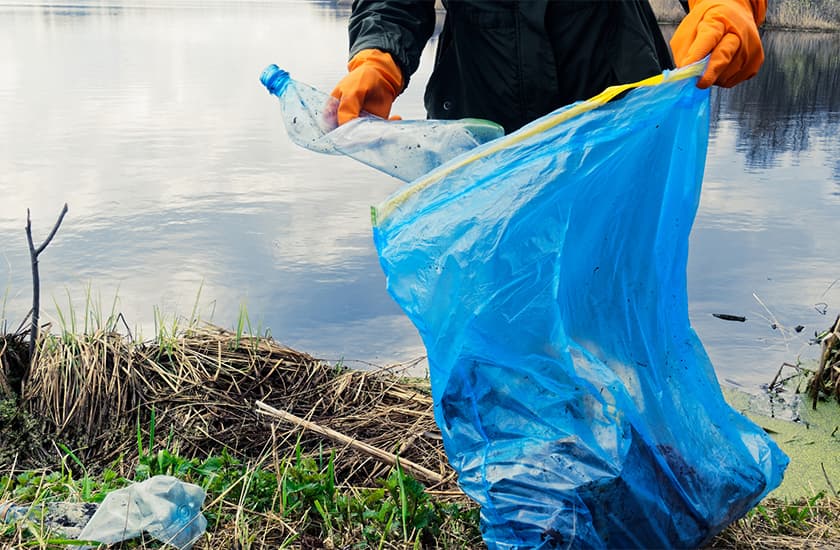Tecside Group Community Safety Focus
For Tecside Group February 24th to March 1st is safety conversation week. Our Talent team are actively engaging and attending our partnering Client sites to deliver toolbox talks for our workforce, aimed to address the importance of our choices and the effects on the environment. Our planet is important to us, and Tecside Group want to continue to educate and empower our workers to take simple actions that make a big impact for the sustainability of our futures.
Clean Up Australia Day
March 1st is Clean Up Australia Day which inspires and empowers communities to clean up, fix up and conserve our environment. This initiative started 30 years ago with the simple idea to make a difference in our own backyard and has now become the nation’s largest community- based environmental event.
Of course, Australia’s waste challenges can’t be solved in just one day, so over the past three decades Clean Up Australia has evolved into an organisation that works with community, government and businesses to provide practical solutions to help us all live more sustainably every day of the year. The focus on March 1st is as much on preventing rubbish entering our environment as it is removing what has already accumulated.
10 Simple Tips to Improve Sustainability
These tips can be universally applied to at work, or at home.
1.Pack A Waste-Free Lunch
The secret of a great packed lunch is to find something that is easy to prepare, uses healthy ingredients, and can be transported easily. Packing your own lunch won’t just cut down on waste, but you’ll also save some serious dollars.
2.Opt Out Of Junk Mail
Junk mail makes up an astonishing 6% of Australia’s total paper usage, amounting to 240,000 tonnes of paper annually. The water needed to produce a year’s worth of catalogues could fill 8,640 Olympic-sized swimming pools. Luckily there are several ways you can opt out, visit Find out How.
3.Reduce Purchasing Packaged Goods
When shopping, always look for products that come in recyclable cardboard boxes, reusable jars or containers, or better still, no packaging at all! Buying products without packaging wherever possible, or at least with recyclable packaging will reduce unnecessary landfill over time.
4.Bring Your Own For Takeaway
Did you know some places offer discounts for bringing your own containers? When getting takeaway food why not take your own containers for an easy way to save money, and help the environment too!
5.Keep Cups Are Key!
As above, taking a keep cup, or reusable cup when purchasing your café coffee is also a simple step to making a huge impact. It’s estimated that 5 billion disposable cups end up in landfill a year, which is about 1 million cups a minute, every hour, every day.
6.Reduce Paper Consumption
Where practical think about eliminating the use of paper towels around your home. Did you know every year, the world discards about 254 million tons of paper towels—that’s more than 72 pounds per person. But unlike aluminum cans or even other types of paper products, paper towels can’t be recycled. It simply isn’t cost-effective to do so, given their relatively low fiber content. A great alternative, therefore, is to substitute with reusable and washable alternatives such as cloth napkins, durable sponges, rags / bar mop towels and/or microfiber cloths.
7.Eco-Safe Food Storage Alternatives
More than 1.2 billion metres, equating to 745,000 miles of cling film is used by households every year – enough to go around the circumference of the world 30 times over!
Cling film is difficult to recycle, information about where specific types of cling film can be recycled is hard to find, meaning the majority of it still ends up in landfill where it takes hundreds of years to degrade and risks leaching chemicals into groundwater. Biodegradable clingfilm alternatives have been developed but many conservation organisations are campaigning against oxo-degradable plastics as they simply degrade into smaller and smaller particles and contribute to marine pollution.
Beeswax wraps are a popular substitute that can cover most things – sandwiches, veggies, bowls and plates.
8.Take Your Eco-Safe Bags
Plastic bags don’t go away; they just break up into smaller and smaller pieces of plastic, taking between 15 and 1,000 years to break down in the environment. In Australia alone, we use over 4 billion single-use plastic bags every year, that’s over 10 million each day!
Most shops now charge extra for plastic bag usage, 15c per bag over a year can equate to quite a sum – better put to your savings or holiday goals. Get into the habit of carrying a reusable shopping bag when you’re out and about, to say no to plastic and avoid extra fees.
9.Invest in a Reusable Water Bottle:
Plastic water bottles usually wind up in landfills, contributing to climate change, and pollute natural habitats where they can cause wildlife injuries and deaths. If you purchased plastic water bottles consistently for 30 years, you might waste well over $9,000 — money that could have been saved for when you need it. Purchase a reusable drink bottle and use tap water or the work drink fountain to fill up.
10.Carpool! Reduce Your Carbon Footprint
If possible, why not make it a habit to carpool, bike, walk or take public transport to your destination. Sustainable transport can save you money, improve your health and reduce your environmental footprint. Reducing single car usage, reduces greenhouse emissions. In some states of Australia carpooling is promoted through offering transit lanes for carpooling purposes – check out your state transport regulations for full details.
How To Get Involved
The above are just some very simple ways that individually are easy to do, but collectively can make a big difference to reduce the amount of waste produced, and which assists in creating a sustainable future for all.
If you are interested in finding out more about Clean Up Australia Day please visit https://www.cleanup.org.au/ or contact 1800 CUA DAY (1800 282 329).

